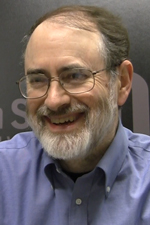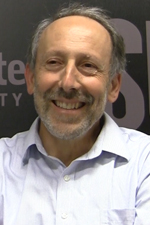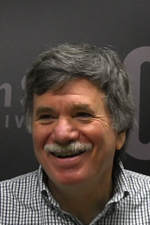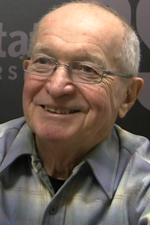Affiliation: Distinguished Professors

Alan Acock Oral History Interview
Life history interview conducted by Chris Petersen.
March 2, 2017
Alan Acock (b. 1944), a Distinguished Professor Emeritus of Human Development and
Family Science, chaired OSU's HDFS department for twelve years, beginning with its
creation in 1990. An accomplished scholar in the field of family studies, Acock is
also well-known for his work in quantitative analysis - one particularly influential
book, A Gentle Introduction to Stata, is now in its fifth edition. He has likewise authored major papers on topics including
the impact of divorce on children and improved methods for working with missing statistical
values. In his interview, Acock traces his career as a sociologist at four different
institutions; comments on growth and change within the HDFS department; and lends
insight into his diverse body of scholarship.

Joe Beckman Oral History Interview
Life history interview conducted by Chris Petersen.
September 15, 2015
Joe Beckman (b. 1953), a Distinguished Professor of Biochemistry and Biophysics, has
been a Principal Investigator at the Linus Pauling Institute and a member of the OSU
faculty since 2001. A leader in the study of neurodegeneration, Beckman has spent
more than twenty years investigating the cause of, and searching for a cure for, amyotrophic
lateral sclerosis (ALS, or Lou Gehrig's Disease). Since 2002, Beckman has also served
as Director of OSU's Environmental Health Sciences Center, an organization that works
to foster and promote research on the impact of the environment on human health.
His interview focuses on his scientific education and military service; his breakthroughs
researching neurodegenerative disease; promising new studies that may result in an
effective treatment for ALS; and the institutional evolution of the Linus Pauling
Institute, the Environmental Health Sciences Center, and OSU itself.

Andy Blaustein Oral History Interview
Life history interview conducted by Chris Petersen.
February 3, 2017
Andy Blaustein (b. 1949) is a Distinguished Professor of Zoology who has worked at
OSU since 1978. A leading scholar of animal behavior and chemical ecology, Blaustein
has conducted especially important work on amphibian deformities and population declines,
and on host-pathogen biology. Formerly the director of OSU's graduate program in Environmental
Science, Blaustein is also a long-time editor of the journal Conservation Biology. In his interview, Blaustein traces his career in research and teaching, and shares
his institutional memories of four decades spent at Oregon State University.

Margaret Burnett Oral History Interview
Life history interview conducted by Chris Petersen.
January 10, 2017
Margaret Burnett (b. 1949) is a Distinguished Professor of Computer Science who has
been a member of the OSU faculty since 1993. A co-founder of the discipline of end-user
software engineering, Burnett is perhaps most prominently known for her development
of the GenderMag protocol, which helps software engineers to evaluate the gender inclusivity
of the programs that they create. Burnett has also made important contributions to
multiple visual programming languages and to the theory of information foraging. The
evolution of her research and her experiences as a woman in the field of computer
science are the primary emphases of her interview.

Tracy Daugherty Oral History Interview
Life history interview conducted by Janice Dilg.
June 2, 2015
Tracy Daugherty (b. 1955) is a Distinguished Professor Emeritus of English and Creative
Writing, having taught and written at OSU from 1986 to his retirement in 2013. The
author of four novels, four short story collections, a book of essays, and three biographies,
Daugherty also played a key role in the creation of a Masters of Fine Arts degree
in Creative Writing at Oregon State. Among many other accomplishments, Daugherty
has received the Oregon Book Award four times, most recently in 2010 for his biography
of the author Donald Barthelme, Daugherty's mentor. His interview focuses on his
development and methods as a writer, the evolution of the Creative Writing program
at OSU, and the important role to be played in academia by citizen-scholars.

Tom Dietterich Oral History Interview
Life history interview conducted by Chris Petersen.
June 10, 2015
Tom Dietterich (b. 1954), a Distinguished Professor Emeritus of Electrical Engineering
and Computer Science, was a member of the OSU faculty from 1985 to his retirement
in 2016. A leading thinker in the field of machine learning, Dietterich has made numerous
contributions to the advancement of artificial intelligence, including multiple applications
of computing power to the solution of a variety of ecological problems. A co-founder
and past president of the Machine Learning Society, Dietterich has also been involved
with a number of several private sector ventures, including work as Chief Scientist
at Strands, Inc. and BigML. His interview focuses on his life-long fascination with
computers, his major contributions to machine learning, and the evolution of Computer
Science over three decades at OSU.

Paul Farber Oral History Interviews
Two life history interviews conducted by Chris Petersen.
October 2014
Paul Farber (b. 1944) is a Distinguished Professor Emeritus of the History of Science
who worked at OSU from 1970 to his retirement in 2008. During his tenure as a member
of the OSU faculty, Farber served as chair of the General Science department and,
after the department's dissolution, the History department as well. A scholar of
the naturalist tradition and evolutionary ethics, Farber has published on a variety
of subjects, including the history of ornithology and changes in American views on
race mixing. His interviews focus on his evolution as a historian, the means by which
he acquired his scholarly toolkit, and his memories of General Science and History
over four decades working at OSU.

Balz Frei Oral History Interview
Life history interview conducted by Chris Petersen.
January 10, 2014
Balz Frei (b. 1958) served as Director of the Linus Pauling Institute at Oregon State
University from 1997 to 2016. A Distinguished Professor Emeritus of Biochemistry and
Biophysics, Frei's research has focused on the mechanisms causing chronic human disease,
in particular atherosclerosis and cardiovascular disease, and the role that micronutrients,
phytochemicals and dietary supplements might play in ameliorating these diseases.
His interview provides an overview of his life experiences and career path, beginning
with his formative years in Switzerland and continuing on to his academic appointments
in the United States. The interview's primary emphasis is Frei's tenure at OSU, with
particular attention paid to the growth of the Linus Pauling Institute under his leadership.

Jon Lewis Oral History Interview
Life history interview conducted by Chris Petersen.
May 4, 2017
Jon Lewis (b. 1955) is a Distinguished Professor of Film Studies who has been a member
of the OSU English faculty since arriving in 1984. The first professor in university
history to be dedicated full-time to Film Studies, Lewis created much of the curriculum
used in OSU's film classes today. He is also a prolific author who has written well-received
books on different shifts in Hollywood film culture, and is a scholar of the life
and work of director Francis Ford Coppola. His 2010 book on The Godfather has been translated into French, Turkish and Mandarin. In his interview, Lewis reflects
on his discovery and love of film; his work in creating a Film Studies program at
OSU; and the different books that he has authored over the course of his career.

Jane Lubchenco Oral History Interviews
Two life history interviews conducted by Janice Dilg.
October 2014 - April 2015
Jane Lubchenco (b. 1947), Distinguished Professor of Zoology, is among the most accomplished
scientists to have ever served as a member of the OSU faculty. Professors in the
Zoology Department since 1977, Lubchenco and her husband, Bruce Menge, have contributed
greatly to the scientific understanding of marine ecosystems around the world. Since
the late 1980s, Lubchenco has also been actively involved in the formation of science
policy, especially as it relates to the nation's coastlines and oceanic environments.
In 2009 Lubchenco was confirmed as the first female head of the National Oceanic and
Atmospheric Administration, a post that she held until 2013. Her interviews discuss
the arc of her education, her career path, highlights of her research program, her
increasing interest in public policy, and her tenure as leader of NOAA.

Chris Mathews Oral History Interview
Life history interview conducted by Chris Petersen.
September 2, 2011
Chris Mathews (b. 1937) is a Distinguished Professor Emeritus of Biochemistry and
Biophysics who worked at OSU from 1978 to his retirement in 2002, chairing the Department
of Biochemistry and Biophysics for the whole of that time. Internationally recognized
as a major contributor to the field of biochemistry with an emphasis on enzymology,
virology, and genetics, Mathews is also a co-author of a highly successful textbook,
Biochemistry, now in its third edition. Mathews was likewise involved with the creation of the
Center for Gene Research at OSU, as well as the establishment of the Linus Pauling
Institute on the OSU campus and the planning of the Agricultural and Life Sciences
Building. His interview focuses on his path through academia, the research that he
has pursued in biochemistry, and his memories of involvement with numerous initiatives
in the sciences over a twenty-four year career at OSU.

Frank Moore Oral History Interview
Life history interview conducted by Chris Petersen.
April 11, 2017
Frank Moore (b. 1945) is a Distinguished Professor Emeritus of Zoology who was an
active member of the OSU faculty from his arrival in Corvallis in 1975 to his retirement
in 2007. Moore is perhaps best known for his discovery of vasotocin, a hormone that
plays a major role in the reproductive behavior of many different types of animal
species, including the salamanders that Moore used as his primary research model.
Moore also made significant contributions to the scientific understanding of neurological
systems in amphibians. In his interview, Moore traces the unusual path that he took
to academia; comments on the major themes of his research; and shares his perspective
on his personal and academic partnership with Kathleen Dean Moore, herself an OSU
Distinguished Professor and acclaimed author.

Michael Oriard Oral History Interviews
Two life history interviews conducted by Chris Petersen.
March 2015
Michael Oriard (b. 1948) is a Distinguished Professor Emeritus of American Literature
and Culture who worked at OSU from 1976 to his retirement in 2013. Oriard is also
a former professional football player who, after receiving All American honors at
the University of Notre Dame, spent four seasons in the National Football League as
an offensive lineman with the Kansas City Chiefs. As an academic, Oriard's primary
focus has been the cultural history of football, and he is widely recognized as an
expert on the United States' most popular sport. In two interviews, Oriard discusses
his life as a student athlete and professional football player, his growth and productivity
as a scholar, and the fragile status and uncertain future of American football.

Bill Robbins Oral History Interview
Life history interview conducted by Mike Dicianna.
June 27, 2017
Bill Robbins (b. 1935) is a Distinguished Professor Emeritus of History who was an
active member of the OSU faculty from 1971 to 1999. Regarded today as a premiere historian
of the American West, Robbins came from a humble background, working as a logger and
elementary school teacher before completing his Ph.D. at the age of thirty-five. During
his highly accomplished career at Oregon State, Robbins authored a two-volume history
of Oregon as well as an acclaimed study of socioeconomic change on Oregon's central
coast. His later works include a biography of Oregon politician Monroe Sweetland and
a history of Oregon State University titled The People's School. Robbins' interview details his unusual path toward academia as well as his institutional
memories from a long career as an OSU History professor.

David Robinson Oral History Interview
Life history interview conducted by Janice Dilg.
September 30, 2015
David Robinson (b. 1947) was a member of the OSU English faculty from 1976 to his
retirement in 2016, and held the Oregon Professorship in English - the OSU College
of Liberal Arts' first endowed chair - from its inception in 1991. Recognized internationally
as an authority on American Transcendentalist authors, Robinson has written numerous
books on Ralph Waldo Emerson and Henry David Thoreau, among other nineteenth century
American writers and philosophers. For fifteen years Robinson also directed the OSU
Center for the Humanities, an institute dedicated to improving the vitality and quality
of humanities teaching and research at Oregon State. His interview focuses on his
personal scholarly evolution; his memories of significant change within the OSU English
department; and his perspective on the broader advancement of the humanities over
a forty year career at OSU.

Henry Sayre Oral History Interview
Life history interview conducted by Janice Dilg.
August 5, 2014
Henry Sayre (b. 1948) is a Distinguished Professor of Art History who has worked at
OSU since 1981 and at the OSU-Cascades campus since its opening in 2001. Sayre is
also an accomplished teacher and the author of a number of books, including a groundbreaking
art appreciation textbook, A World of Art, now in its seventh edition, and the children's book From Cave Paintings to Picasso, winner of an Oregon Book Award. As chair of the curriculum committee and as academic
provost, Sayre has also been instrumental in the on-going development of the Cascades
campus in Bend, Oregon. His interview focuses on his experiences as a professor in
the liberal arts at OSU, his leading role at OSU-Cascades, and his influential work
as an art historian and art educator.

John Selker Oral History Interview
Life history interview conducted by Chris Petersen.
August 25, 2015
John Selker (b. 1960) is a Distinguished Professor of Biological and Ecological Engineering
whose research has specialized in water resources engineering with a particular focus
on developing low-cost technical solutions to agricultural and environmental challenges
faced by the developing world. A veteran traveler who spent his initial years after
college leading cook stove programs in Africa and Asia, Selker is also a driving force
behind the Trans-African Hydro and Meteorological Observatory project, an initiative
that is using a collection of small weather stations to provide more accurate meteorological
information to the continent's agriculturalists. Selker's interview focuses on his
formative experiences traveling and working in Africa; his institutional memories
of agricultural engineering at OSU; and his continuing efforts to improve quality
of life for some of the planet's most vulnerable populations.

Lew Semprini Oral History Interview
Life history interview conducted by Chris Petersen.
February 22, 2017
Lew Semprini (b. 1952) is a Distinguished Professor of Environmental Engineering who
has been a member of the Oregon State faculty since 1993. An expert on in situ bioremediation of contaminated environments, Semprini has uncovered a wide array
of mechanisms for treating hazardous substances that have polluted industrial, military
and residential locations alike. One project in particular, which used samples of
Willamette River water collected in Corvallis, led to the discovery of microorganisms
that could metabolize chlorinated solvents. In his interview, Semprini details the
evolution of his career as a scientist and engineer, with particular attention paid
to the development of the Environmental Engineering program at OSU.

Fred Stormshak Oral History Interview
Life history interview conducted by Chris Petersen.
December 22, 2015
Fred Stormshak (b. 1936) is a Distinguished Professor Emeritus of Animal Sciences
who was a member of the OSU faculty from 1968 to his retirement in 2001. Stormshak
spent much of his career at Oregon State studying the ovary and uterus of the domestic
animal, with particular attention paid to the functioning of the corpus luteum, an
ephemeral and short-lived gland that plays a crucial role in the reproductive process.
In 1996, he and a colleague began a program of research on the biological basis of
male-oriented behavior in rams; work that eventually made headlines around the world.
Funded by the NIH and continuing to this day, the studies have focused on a group
of neurons in the anterior hypothalamus that may play a crucial role in the scientific
understanding of sexual behavior in sheep. Stormshak's interview details his upbringing
in rural Washington; his education in Dairy Science and Endocrinology; the broad array
of research that he has conducted at OSU; and his institutional memories of Animal
Science at OSU.

Steve Strauss Oral History Interview
Life history interview conducted by Chris Petersen.
March 7, 2017
Steve Strauss (b. 1955) is a Distinguished Professor of Forest Biotechnology who has
been a member of the Forestry faculty at OSU since 1985. Over the course of his career,
Strauss has conducted groundbreaking research on tree genetics, using poplars as his
primary model organism. Much of this work has incorporated techniques of genetic engineering,
an issue that has become increasingly contentious over the course of Strauss' years
in academia. In his interview, Strauss traces the arc of his research and comments
on the many ways in which changes in the conventional wisdom have compelled him to
adapt or reorient his scholarly work. Strauss likewise provides valuable insight into
the evolution of the College of Forestry during the years of his association.

Robert Tanguay Oral History Interview
Life history interview conducted by Chris Petersen.
April 21, 2017
Robert Tanguay (b. 1966) is a Distinguished Professor of Molecular Toxicology who
joined the OSU faculty in 2003. The Director of the Sinnhuber Aquatic Research Laboratory,
Tanguay has built an international reputation for his use of zebrafish as a model
for analyzing the toxicological impact of thousands of different chemical compounds.
In 2009, his laboratory received a major grant from the Environmental Protection Agency
that was used to conduct the largest in vivo toxicological study to date - an examination
of some 1,200 compounds yielding data on half a million zebrafish. Tanguay also speaks
regularly to both public and private entities on the biosafety of various commercial
developments, including flame retardants and the practice of fracking. His interview
traces his career in science with particular attention paid to his zebrafish studies
at OSU.

Dick Waring Oral History Interview
Life history interview conducted by Chris Petersen.
December 18, 2015
Dick Waring (b. 1935) is a Distinguished Professor Emeritus of Forest Science who
was an active member of the OSU Forestry faculty from 1963 to his retirement in 2001.
Waring's career at OSU was characterized by influential research on a number of topics
in forest science, from building models of the flow of carbon and water through forest
systems, to investigations of trees' defenses against bark beetles and spruce budworm.
In the 1980s, he developed a relationship with NASA that led to multiple projects
utilizing remote sensing technology to better understand forest systems. More recently,
he has turned his attention to climate change and the future of the world's forests,
co-authoring a 2014 book on the subject titled Forests in Our Changing World. Waring's interview details his wide range of research interests over the decades,
and includes commentary on the evolution of the OSU College of Forestry as well.

A Remembrance of William Appleman Williams
An interview with Bill Robbins conducted by Chris Petersen.
March 27, 2012
William Appleman Williams (1921-1990), an influential American historian and writer,
was a member of the History faculty at Oregon State University from 1968-1986. He
is regarded to be a founder of the "revisionist school" of American diplomatic history.
A prolific author, Williams' The Contours of American History (1961), was named by the Modern Library as one of the 100 best non-fiction books
written in English in the twentieth century. Bill Robbins, Distinguished Professor
Emeritus of History, was a member of the OSU History faculty from 1971 to his retirement
in 1999. Williams and Robbins were close friends and valued colleagues, and in this
interview Robbins shares his recollections of Williams' work, personality and impact.

Ron Wrolstad Oral History Interview
Life history interview conducted by Chris Petersen.
December 14, 2015
Ron Wrolstad (b. 1939) is a Distinguished Professor Emeritus of Food Science and Technology
who attended Oregon State College as an undergraduate and was an active member of
its faculty from 1965 to his retirement in 2004. An accomplished and highly cited
agricultural scientist, Wrolstad has made important contributions to the study of
fruit juice adulteration, ultimately becoming a trusted authority on the subject and
receiving funding from both public and private sources to act as a check on fruit
juice producers worldwide. Wrolstad likewise contributed to the body of research on
natural colorants, including a project investigating the use of radish extract to
achieve the red color associated with maraschino cherries. In his interview, Wrolstad
reflects on his undergraduate years at OSC; comments on the legacy of maraschino cherry
work at Oregon State; details the themes of his research over time; and shares his
institutional memories of a sixty-year association with the Food Science and Technologies
Department.
